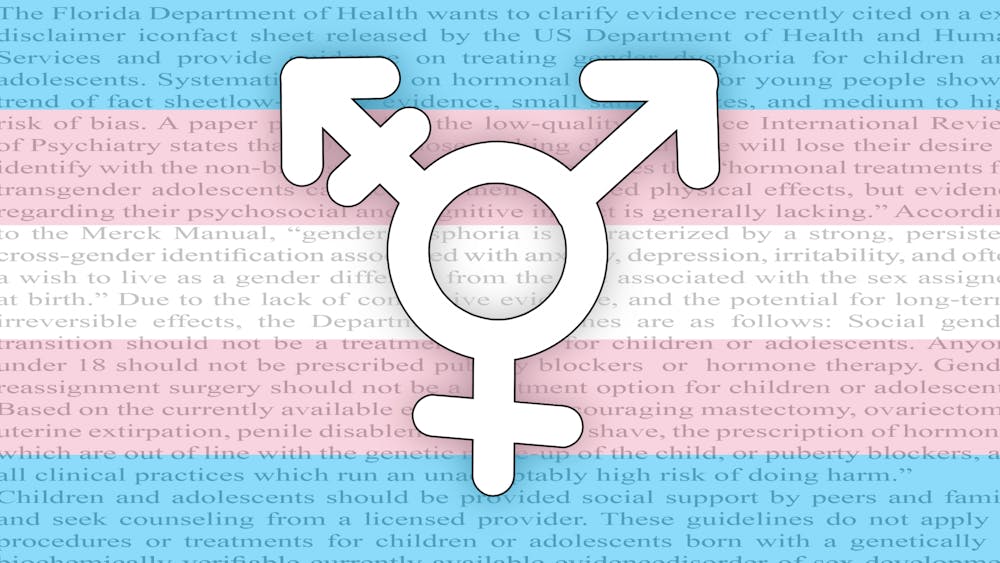Natasha Klayman came out as a woman during the COVID-19 pandemic — a time where the isolation gave her time to think about and explore her gender identity. But under a new Florida rule, she must grapple with the fact that future gender-affirming care could be denied to her under a Medicaid plan.
“It's hard to exist as yourself when it feels like half the country wants to kill you or wants to erase you,” the 23-year-old UF marine science senior said.
She’s one of many transgender Floridians who are being impacted by the Agency for Health Care Administration’s ban on gender-affirming care coverage, which went into effect Aug. 21.
These treatments include puberty blockers, hormone therapy, gender reassignment surgeries and all other procedures that alter sexual characteristics, according to the Medicaid policy.
A motion for a preliminary injunction was heard and denied by a judge Oct. 12. The motion was part of a federal lawsuit filed by a coalition of advocacy and legal groups.
The preliminary injunction would’ve temporarily blocked enforcement of the AHCA’s Medicaid policy during the trial.
In April, the Florida Department of Health released guidance on the treatment of gender dysphoria following a statement by the U.S. Department of Health and Human Services that stated gender-affirming care is a crucial form of health care in children and adolescents.
The FDOH’s guidance challenged this stance and recommended against all gender-affirming care, including social gender transitions, such as changes in pronouns or clothing.
In June, the AHCA published a medical standards memo on the treatment of gender dysphoria and initiated the rule-making process for a Medicaid policy related to gender-affirming care.
Klayman is currently taking a hormone replacement therapy regimen provided by the UF Student Health Care Center, she said. While the AHCA’s ban hasn’t currently impacted her ability to receive hormone therapy, it has impacted her friends.
“I had a friend who had to switch insurance because their medication was no longer being covered,” Klayman said.
Klayman wasn’t surprised when the AHCA announced its rule. She was crushed, she said.
“It was a complete and utter mockery of what that medicine and what those standards should mean,” she said. “[Gender-affirming care] allows me to live life in a way that makes me comfortable and in a way that is valid to who I am.”
Klayman has felt constant worry, she said, since the AHCA’s ban went into effect.
“It’s scary existing in public,” she said. ”When I drive from Gainesville back to my hometown in Tampa, I do not stop at bathrooms. I am worried about that. I am scared of what this sort of constant propaganda is going to mean for my safety and the safety of the people I care about.”
In 2017, Lei Anna-Rizea, a 38-year-old UF geology and psychology senior, received a breast reduction from a non-LGBTQ specialist plastic surgeon to feel more content about their appearance. When Anna-Rizea requested their reduction, they were still learning about their gender identity — non-binary and genderqueer — and had also been dealing with back pain.
“I pushed and pushed,” Anna-Rizea said. “I was like, ‘Listen, I want to pass for flat,’ and he laughed at me. He laughed, and you know what? They didn't do it.”
Anna-Rizea didn’t get the full reduction they wanted, but they said they were much more comfortable after the operation.
They paid for the surgery out of pocket — around $8,000.
In July, Anna-Rizea had a hysterectomy from a doctor who had experience working with LGBTQ people.
“It was night and day difference,” they said. “I feel amazing. For me — and I think for a lot of people in the community — it's not all at once. It's figuring yourself out, and it’s a journey.”
Anna-Rizea remembers feeling disappointed when the FDOH released guidance on gender dysphoria treatment for children and adolescents.
“I don't know any child that doesn't experiment with their identity, with their clothes or with nicknames, just as a norm,” Anna-Rizea said.
Anna-Rizea has two children: a daughter and younger child who uses they/them pronouns.
Anna-Rizea is giving their children the option to pick whatever identity they feel is right for them, they said.
However, they’re concerned about how the AHCA’s rule will affect their care and their childrens’ care in the future. Leaving Florida has been a thought that’s crossed their mind, they said.
“I stay up at night,” Anna-Rizea said. “I've cried in the shower.”
Without gender-affirming care, many children suffering from gender dysphoria could develop severe mental illness, Anna-Rizea said.
“If you knew that your child was going to die, that your child is going to take their own life enveloped in depression because they were forced to endure an identity that they had no control over, that's the path you would choose?” they asked.
When a child experiences gender dysphoria, they’re evaluated by a multidisciplinary team that includes psychologists and physicians, said Michael Haller, UF professor and chief of pediatric endocrinology.
“When children are pre-pubertal, providing counseling for the family about what to expect in the future is the extent of the treatment,” Haller said. “There are no hormones or blockers used in pre-pubertal children.”
As children get older and go through puberty, it may worsen their gender dysphoria, Haller said.
At that point, puberty blockers may give patients and families time to process their dysphoria and ensure they’re certain of their gender identity, Haller said.
“Gender-affirming hormones like testosterone or estrogen are started only after gender identity is well established and typically only after pubertal blockers have been given for several years,” Haller said. “The number of [adolescents] being referred for surgical interventions is incredibly low.”
The memo published by the AHCA determined treatment for gender dysphoria is considered experimental.
Many of the memo’s statements and recommendations were contrary to the consensus of several major national medical organizations such as the American Medical Association, the American Psychological Association and the American Academy of Pediatrics.
“They're not investigational,” Haller said. “Gender-affirming care has been around for decades.”
The AHCA’s memo has been debunked by medical and legal professionals across the country.
“We have concluded, after a careful examination of the June 2 Report, that its conclusions are incorrect and scientifically unfounded,” read a critical review of the Florida Medicaid report by Yale University.
When the Medicaid policy went into effect, Haller noticed the volume of calls and concerns from patients and families increased dramatically, he said.
“People were urgently trying to figure out what they really had access to,” he said.
Currently, Florida patients on Medicaid insurance who have been newly prescribed medication or referred for surgery, as it relates to gender-affirming care, won’t have their care covered. But if a patient had a prior authorization in place, then it’ll be honored until that authorization expires, Haller said.
Avril Kiker, a 20-year-old Santa Fe geography sophomore, said she began hormone replacement therapy in September.
“[Gender-affirming care] really helps improve one's self-image and the way others see you,” she said.
The AHCA’s ban and the anti-gender-affirming guidance released during the summer made her feel awful, she said.
“We’re supposed to live in a democracy, but our legislation is not making the decisions that the majority of Floridians want,” Kiker said. “They’re messing with people’s lives.”
Contact Melanie Peña at mpena@alligator.org Follow them on Twitter @MelanieBombino_.

Melanie Peña is a second-year business and journalism major. When she's not designing a graphic or writing an article, she's probably making jewelry or exploring coffee shops in Gainesville.






